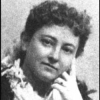Olive Schreiner

Olive Schreiner
Olive Schreinerwas a South African author, anti-war campaigner and intellectual. She is best remembered today for her novel The Story of an African Farm which has been highly acclaimed since its first publication in 1883 for the bold manner in which it deals with some of the burning issues of the day, including agnosticism, existential independence, individualism, the professional aspirations of women, and the elemental nature of life on the colonial frontier. In more recent studies she has also been...
NationalitySouth African
ProfessionWriter
Date of Birth24 March 1855
It is finer to bring one noble human being into the world and rear it well... than to kill ten thousand.
Soul, what have I to do with you?
Marriage for love is the most beautiful external symbol of the union of souls; marriage without it is the least clean traffic that defiles the world.
There are some of us who in after years say to Fate, 'Now deal us your hardest blow, give us what you will; but let us never again suffer as we suffered when we were children.' The barb in the arrow of childhood's suffering is this: its intense loneliness, its intense ignorance.
Slavery may, perhaps, be best compared to the infantile disease of measles; a complaint which so commonly attacks the young of humanity in their infancy, and when gone through at that period leaves behind it so few fatal marks; but which when it normally attacks the fully developed adult becomes one of the most virulent and toxic of diseases, often permanently poisoning the constitution where it does not end in death.
We are a race of women that of old knew no fear and feared no death, and lived great lives and hoped great hopes; and if today some of us have fallen on evil and degenerate times, there moves in us yet the throb of the old blood.
Love that has been given to you is too sacred a thing to be talked of to anyone ... except just to the person who is like part of you and who will feel it as you do.
... marriage has been a very rich and beautiful development of my life. Month by month as we live together we seem to come nearer to each other; and to feel a more complete fellowship. I do not feel that it in any way fetters or narrows my world: -- it seems rather to enlarge it ...
A child sees everything, looks straight at it, examines it, without any preconceived idea....
[Finishing schools] are nicely adapted machines for experimenting on the question, "Into how little space a human being can be crushed?" I have seen some souls so compressed that they would have fitted into a small thimble, and found room to move . . .
To us, from the beginning, Nature has been but a poor plastic thing, to be toyed with this way or that, as man happens to please his deity or not; to go to church or not; to say his prayers right or not; to travel on a Sunday or not.Was it possible for us in an instant to see Nature as she is-the flowing vestment of an unchanging reality?
There's something so beautiful in coming on one's very inmost thoughts in another. In one way it is one of the greatest pleasures one has.
It is the swimmer who first leaps into the frozen stream who is cut sharpest by the ice; those who follow him find it broken, and the last find it gone. It is the men or women who first tread down the path which the bulk of humanity will ultimately follow, who must find themselves at last in solitudes where the silence is deadly.
I am always thirsting for beautiful, beautiful, beautiful music. I wish I could make it. Perhaps there isn't any music on earth like what I picture to myself.